Former Police Officer Acquitted in the Death of Anthony Lamar Smith
Protesters march in the streets of downtown St. Louis after the verdict.Truthdig editor’s note: Late Friday about 1,000 protesters gathered around the residence of St. Louis Mayor Lyda Krewson to protest the acquittal of a white former policeman accused of murdering a black man suspected of dealing illegal drugs, according to the St. Louis Post-Dispatch. Windows were broken at the home and two police officers were wounded by hurled bricks, police said.
ST. LOUIS — A white former police officer was acquitted Friday in the 2011 death of a black man who was fatally shot following a high-speed chase, with the judge declaring that he would not be swayed by “partisan interests, public clamor or fear of criticism.”
The acquittal of Jason Stockley in the death of Anthony Lamar Smith had stirred concerns about possible civil unrest for weeks. Several hundred protesters were marching in the streets of downtown St. Louis within hours of the verdict, but only a single arrest had been reported as of midday.
The case played out not far from the suburb of Ferguson, which was the scene of the fatal shooting of Michael Brown, the unarmed black 18-year-old who was killed by a white police officer in 2014. That officer was never charged but eventually resigned.
Stockley, who was charged with first-degree murder, insisted he saw Smith holding a gun and felt he was in imminent danger. Prosecutors said the officer planted a gun in Smith’s car after the shooting. The officer asked the case to be decided by a judge instead of a jury.
“This court, in conscience, cannot say that the State has proven every element of murder beyond a reasonable doubt or that the State has proven beyond a reasonable doubt that the defendant did not act in self-defense,” St. Louis Circuit Judge Timothy Wilson wrote in the decision .
St. Louis Circuit Attorney Kim Gardner said she was disappointed.
“While officer-involved shooting cases are extremely difficult to prevail in court, I believe we offered sufficient evidence that proved beyond a reasonable doubt” that Stockley intended to kill Smith, Gardner said in a written statement.
The head of the St. Louis chapter of the NAACP asked President Donald Trump and the Justice Department to review the acquittal.
Assistant Circuit Attorney Robert Steele emphasized during the trial last month that police dashcam video of the chase captured Stockley saying he was “going to kill this (expletive), don’t you know it.”
Less than a minute later, the officer shot Smith five times. Stockley’s lawyer dismissed the comment as “human emotions” uttered during a dangerous police pursuit. The judge wrote that the statement “can be ambiguous depending on the context.”
Prosecutors objected to the officer’s request for a bench trial.
The Constitution guarantees the right of criminal suspects to have their cases heard “by an impartial jury.” But defendants can also opt to have the verdict rendered by a judge.
Stockley, 36, could have been sentenced to up to life in prison without parole. He left the St. Louis police force in 2013 and moved to Houston.
The case was among several in recent years in which a white officer killed a black suspect. Officers were acquitted in recent police shooting trials in Minnesota, Oklahoma and Wisconsin. A case in Ohio twice ended with hung juries, and prosecutors have decided not to seek a third trial.
Ahead of the verdict, activists in St. Louis threatened civil disobedience if Stockley were acquitted, including possible efforts to shut down highways. Barricades went up on Aug. 28 around police headquarters, the courthouse where the trial was held and other potential protest sites.
Fears of unrest prompted several downtown businesses to send employees home early, including two of the biggest, Wells Fargo Advisors and Nestle Purina PetCare. U.S. Bank closed six branches. Some schools closed early and postponed events scheduled for Friday.
Protester efforts at civil disobedience were largely unsuccessful. When several demonstrators tried to rush onto Interstate 64, they were blocked on an entrance ramp by police cars and officers on bikes. When they tried to enter the city’s convention center, the doors were locked.
At one point, a group of the protesters stood in front of a bus filled with officers in riot gear, blocking it from moving forward. When officers began pushing back the crowd, protesters resisted, and police responded with pepper spray, two women told The Associated Press.
Both women’s faces had been doused with milk, which is used to counter the effects of pepper spray.
The Rev. Clinton Stancil, a protest leader, said the acquittal was shocking based on the evidence but not surprising.
“It’s a sad day in St. Louis, and it’s a sad day to be an American,” Stancil said.
One man was arrested for damaging a police vehicle. There were also scattered reports of protesters attacking journalists, authorities said.
The St. Louis area has a history of unrest in similar cases, including after Brown’s death, when protests, some of them violent, erupted.
In Smith’s case, the encounter began when Stockley and his partner tried to corner Smith in a fast-food restaurant parking lot after seeing what appeared to be a drug deal. Stockley testified that he saw what he believed was a gun, and his partner yelled “gun!” as Smith backed into the police SUV twice to get away.
Stockley’s attorney, Neil Bruntrager, argued that Smith, a 24-year-old parole violator with previous convictions for gun and drug crimes, tried to run over the two officers. Stockley fired seven shots as Smith sped away. A chase ensued.
At the end of the chase, Stockley opened fire only when Smith, still in his car, refused commands to put up his hands and reached along the seat “in the area where the gun was,” Bruntrager said. Stockley said he climbed into Smith’s car and found a revolver between the center console and passenger seat.
But prosecutors questioned why Stockley dug into a bag in the back seat of the police SUV before returning to Smith’s car.
The gun found in Smith’s car did not have his DNA on it, but it did have Stockley’s.
___
Associated Press Writer Summer Ballentine contributed to this report.
Your support is crucial…With an uncertain future and a new administration casting doubt on press freedoms, the danger is clear: The truth is at risk.
Now is the time to give. Your tax-deductible support allows us to dig deeper, delivering fearless investigative reporting and analysis that exposes what’s really happening — without compromise.
Stand with our courageous journalists. Donate today to protect a free press, uphold democracy and unearth untold stories.
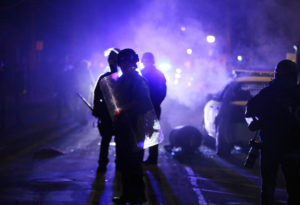
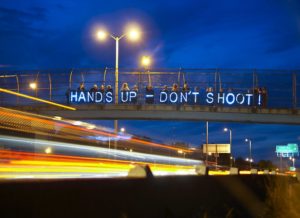
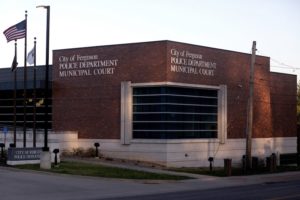
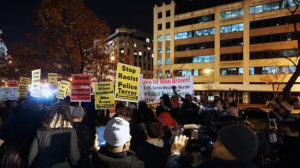
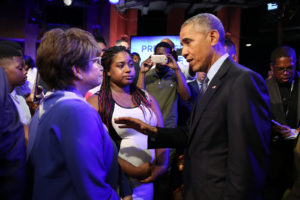
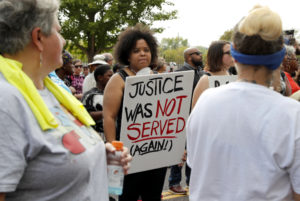
You need to be a supporter to comment.
There are currently no responses to this article.
Be the first to respond.